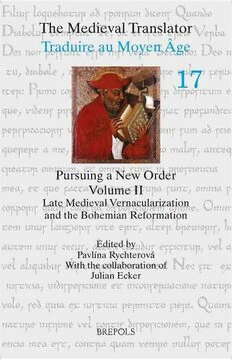
Pursuing a New Order II: Late Medieval Vernacularization and the Bohemian Reformation (Medieval Translator) (The Medieval Translator: Traduire au moyen age, 17) PDF
322 Pages·1.771 MB·English
Most books are stored in the elastic cloud where traffic is expensive. For this reason, we have a limit on daily download.
Preview Pursuing a New Order II: Late Medieval Vernacularization and the Bohemian Reformation (Medieval Translator) (The Medieval Translator: Traduire au moyen age, 17)
Description:
In the first two decades of the fifteenth century, the Hussite reform movement formed in Bohemia; it used one of the vernacular languages of the realm, Czech, as a vehicle for the dissemination of its reform ideas, and for the creation of a strong and stable basis for the reform. The vernacular became a very important strategy of identification able to bind the usually disconnected religious, ethnic, political and regional identities together and generate a very potent aggregate of identifications. The material covers the second half of the fourteenth century to the first half of the sixteenth beginning with the so-called Hussite 'forerunners' and ending with the early German reformation. Individual essays discuss the various functions of the vernaculars in different text types, social situations and religious as well as political contexts. The volume provides materials for a future history of the Hussite vernacular theology and contributes to the transformation of the scholarly narratives about the Hussite movement by including works of vernacular religious education among the most important source material. It offers a basis for the comparative research on the role of the vernaculars in the late medieval religious reform efforts.
See more
The list of books you might like
Most books are stored in the elastic cloud where traffic is expensive. For this reason, we have a limit on daily download.
